 Like most people, I remember very clearly how I felt when the results of the November 2008 election began coming in. I was sitting in the home of one of my friends. He’d thrown a party (some of the guests were candidates in the local election), and we were all sitting around anxiously watching the television and checking our laptops. We, all of us, Green or not, wanted Barack Obama to win, and everyone’s focus was on the local and national results. Everyone’s but mine.
Like most people, I remember very clearly how I felt when the results of the November 2008 election began coming in. I was sitting in the home of one of my friends. He’d thrown a party (some of the guests were candidates in the local election), and we were all sitting around anxiously watching the television and checking our laptops. We, all of us, Green or not, wanted Barack Obama to win, and everyone’s focus was on the local and national results. Everyone’s but mine.
I was only paying marginal attention to the television. I do remember saying, “What the hell, [random red state]? You suck!” when a state would go for McCain. But my browser wasn’t on the Champaign City Council’s website. And it wasn’t on CNN’s either. I was the only one in the room paying attention to what was happening in Florida, Arkansas, Arizona, and especially California. And when those results began coming in, I felt like I’d been kicked in the stomach. I remember turning to someone beside me and quietly saying, “California just effectively divorced thousands of gay couples against their will. I’m going home now.” And I left. I didn’t want to be there anymore, surrounded by people.
The next day, I learned that the previous night’s predictions were correct. California (Proposition 8), Arizona (Proposition 102), and Florida (Amendment 2) had banned same-sex marriage (California changed its own state constitution to do so). Florida had also banned civil unions, and Arkansas had banned adoption for same-sex couples (Act 1).
What Proposition 8’s passage in California told us is that even the small number of rights we had gained — rights we already had — could be taken away at the ballot box, at our neighbors’ whims. That day, as a little over half of the nation celebrated, my friends and I walked around like, well, like we’d been kicked in the stomach. A friend told me that at her job, everyone was thrilled with the results of “the election,” and giddy with triumph. She is out at her job, and mentioned California to someone, who responded, “Oh yes. That’s just terrible,” and awkwardly moved along.
“We won! We won!” We heard that everywhere. But most of us in the queer community didn’t feel like we’d won much of anything at all.
What we knew was that if we didn’t do something, and do it quickly, what had happened in California, and Arizona, and Florida, and Arkansas (and all the states before them) would keep happening. And — in Paul Katami’s words — we’d continue to lose access to “that language that is global”: I’m married; my husband; my wife; my lawfully wedded spouse.
So we did the only thing we thought we could do, what we’ve done in the past, we protested. And we did it all over the country.

Anti-Proposition 8 protest in Washington, D.C. (Wikipedia)
More interviews, and more outrage (by gays and straights, alike) followed, and more boycotts and protests. “No more Mr. Nice Gay.” We heard that everywhere. And then the American Foundation for Equal Rights (AFER) filed their lawsuit, Perry v. Schwarzenegger (now Perry v. Brown) and retained two brilliant attorneys, Theodore Olson and David Boies. And finally, it began to become very clear to everyone that we weren’t going to roll over and be quiet about this anymore.
Olson and Boies argued their case brilliantly. The trial was not aired and video has not been released, but the Courage Campaign’s project Prop 8 Trial Tracker live-blogged it in its entirety. Closing arguments were made on June 16, 2010, and on August 4, Judge Vaughn Walker ruled in favor of the Plaintiffs and overturned Proposition 8. Of course, an appeal was immediately filed because that’s how America rolls. On February 7, 2012, the Ninth Circuit upheld the decision of the district court, and on June 5 they denied a request for a rehearing en banc. The case is now in the hands of the U.S. Supreme Court.
In the middle of all of this, AFER Founding Board Member Dustin Lance Black wrote the verbatim theatre play 8, which narrates witness testimony from the trial. In the play, the performers read from the original transcripts of interviews, journalists’ reports, and the trial itself, effectively weaving the story of the events that led up to the election, the passing of Proposition 8, and all of its aftermath.
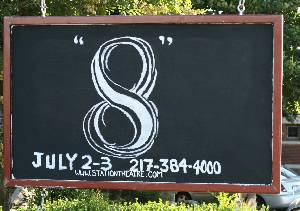 Black’s play opened at the Eugene O’Neill Theatre in New York, and later in Los Angeles. It is now licensed to be performed nationwide, and on Monday and Tuesday, July 2–3, we will get to see it in the Station Theatre.
Black’s play opened at the Eugene O’Neill Theatre in New York, and later in Los Angeles. It is now licensed to be performed nationwide, and on Monday and Tuesday, July 2–3, we will get to see it in the Station Theatre.
I attended a dress rehearsal earlier this week, and the talent in this cast is some of the best that the Station has. The set is spartan, and there are no actual costumes to speak of. The play’s director, Mathew Green, told the cast that 8 is “in every sense, meant to be a movement. Part of the charm is that it is no frills.”
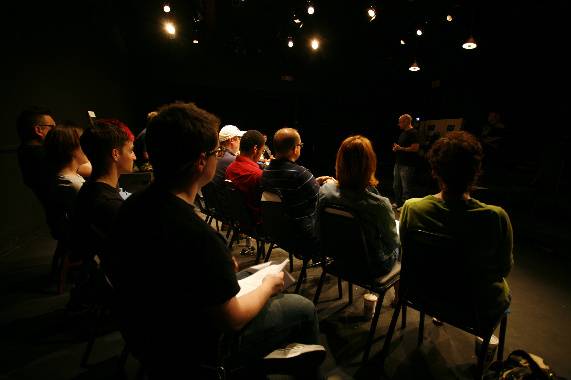
In this play, you will hear romantic prose, medical jargon, statistics, sociological lectures, touching private moments, clumsy attempts to rationalize discrimination, and vile bigotry. Green instructed the cast to allow the “words to do the business; we really can trust them,” and he’s right.
Keeping in mind that what I saw was a first-time reading, cast standouts for me were:
- Thom Miller, who plays Charles Cooper, attorney for the defense. Miller adapts a smug, supercilious demeanor, without being over-the-top about it. I’ve read the live blogs from the trial and this interpretation is appropriate.
- Mike Prosise, who plays David Blankenhorn, witness for the defense. Prosise is utterly convincing as a confused, nervous, frustrated man who doesn’t completely believe his own testimony, and knows that he’s wholly outmatched by Mr. Boies.
- Kay Bohannon Holley, who plays the horrid Maggie Gallagher. Holley has taken hold of this brief, but substantial role and completely owns it.
As I said, this was a first reading, but even so, the entire cast is vibrant and credible and moving. You feel that they believe what they’re saying — even those playing the defendants.
The Station is performing this play free of charge (a donation is suggested, but not required), and both nights are already sold out. When I learned this, I was momentarily despondent. “My preview won’t publish until Friday afternoon,” I thought, “I’m too late to promote the play.” How self-involved is that? The Station has sold out both nights of a landmark play, and I was worried about my article.
So after I pulled myself together, I decided to treat this preview differently. Mathew Green, who directed and produced 8, spoke with me recently about the play. But our conversation turned to other topics as well. Green described his own feelings about discrimination against LGBT people, and also the theatre community’s reactions toward it. He talked about what it’s like directing 8 and working with such an incredible stable of talent. And he touched a little on the fact that the Station is celebrating its 40th anniversary (and mentioned an exciting project that he’s been involved in). Usually, when digressions from the topic at hand occur in my interviews (as they almost always do), I edit them out. But because my original purpose for this article was to promote the play, and that’s really no longer a necessity, I’ve decided to include the vast majority of our conversation here. If you’re interested in local theatre at all, you should find much in the conversation to enjoy.
Mathew Green is a local treasure. If you’ve ever seen him on stage or watched a play he’s produced or directed, here’s your chance to get to know (at least a little) the gentleman behind the talent.
~~*~~
Smile Politely: Did you watch Black’s original play when it became available on the internet? Have you seen it performed live?
Mathew Green: I saw the L.A. version with Clooney and Martin Sheen, which I thought was really well done. I think in some instances like that it tends to buckle under the star power. You catch yourself thinking, ‘There’s George Clooney. There’s Brad Pitt,’ instead of really absorbing the play like you would in the theatre. But I thought they did a very good job with it. I watched it and I loved it. There were wonderful subtleties in it, which you don’t necessarily expect from something based on trial transcripts. It’s not just meant to sound like people really talk. It’s what they really said, so to define the nuance in that, I thought was really lovely.
SP: Have you seen it performed live?
Green: Honestly, I usually … it’s typical of me, when I direct something, not to have seen it. I’ll read it over and over, but I typically don’t attend it live. So watching even the recorded version was different for me. I wanted to see it to see it, but then I found out it was possible to do it. And then I was all in.
SP: Do you know anyone personally who was affected by the passing of Proposition 8?
Green: Not in California. I can say that. So, Prop 8, itself? No. I know a number of people in committed relationships. I know a number of people who either have been married or consider themselves married, and either that relationship is not recognized or in some cases it’s been unrecognized because of changing laws. And that’s heartbreaking.
SP: And after the 2008 election, it was such a confusing time because we wanted to be happy, and we were, but the president that we (in the queer community) had helped get elected wasn’t on our side either, at least regarding this issue. At least that’s what he said at the time.
Green: That’s part and parcel of a lot of civil rights fights. “We gained this, but this is lacking.” Or, we’re really happy about one part, but want to know when the rest will catch up. It’s unfortunate because to be … it’s the twenty-first century and we’re still trying to secure civil rights for all of our people.
SP: And we’re still fighting to just keep the Bible out of our laws. After all of this time.
Green: Whenever people talk about the “sanctity of marriage,” in my mind I can’t keep religion out of their voice. I’ve been married for eight years and I did not get married in a church. The word “God” was never mentioned. This was at a courthouse, because I had the person I wanted to be with, we went, we signed the paper, the ceremony took place, it was legal. It wasn’t a wedding; it was a marriage. A wedding, by the way? Inherently theatrical.
SP: Yes, a performance itself.
Green: It is! It’s meant to be an act of theatre. It’s a show, in the best possible sense.
SP: Everybody has lines. Everybody has places. “Don’t miss your cue.”
Green: Yes. It’s a pageant or a play or whatever you want to call it. So it is inherently theatrical. But whenever they talk about the sanctity of marriage, you know they’re talking about their religious viewpoint. It’s not a legal argument; it’s an entirely religious argument. And every time you put religion and politics together, all it does is create exclusion and oftentimes hate. And it’s ridiculous.
SP: With a few exceptions, religion and politics, on their own, are mostly harmless. Conjoining the two, though…
Green: People get hurt. What would happen if we lived in a society where politicians and pundits of both parties got up and said, ‘This is what I think,’ regardless of who paid them, regardless of who they worked for?
SP: I don’t think we ever have lived in a society like that. Not in my lifetime at least.
Green: Probably not. The other day, I was talking with my wife about the fact that our daughter, if we’re very lucky, will never have to live in a world where people are treated differently because of color. And if we’re really lucky, by the time she’s cognizant of it, she might not have to live in a world where people are treated differently because of sexual orientation.
SP: It sounds like you’re raising your daughter right.
Green: [Laughs] Her only religion is theatre, until she decides differently.
SP: So, from what we’ve been discussing, is this why you chose to produce 8? Is this why you decided to bring it to C-U? Are there other reasons?
Green: Well, having seen it, I think that it is a very powerful piece of theatre. Not just because I agree with its political viewpoint, but just as a person, the human drama of it is very powerful, it definitely draws you in.

I have always been fascinated with pieces that were taken from actual events. You look at what Tectonic Theater Project did with The Laramie Project or any number of things like that which are based on testimony or interviews and then shaped into a piece of theatre. I love that. It’s like taking found objects and making a sculpture. You’re making something to inspire and hopefully educate people that comes from people. It’s not one person’s vision; it’s not Shakespeare hundreds of years ago, saying, ‘This is a story,’ and people going, ‘That’s wonderful,’ and then they do the same thing over and over. It’s taking the words and actions of real people and showing you the dramatic stories that are taking place all around us.
My circle of friends, we’re all fairly dramatic people anyway, but when you watch the news you get a piece of the real story, however much news they can fit into however much time they have between commercials and sports and the weather. But this is their actual story in their words, and I love things like that. So, after I watched the production online with Clooney and Sheen, I went to the website because I wanted to read more about it, how the play came about, and as I was reading it said, “Stage your reading.”
SP: It’s Fate!
Green: [Laughs] And the little theatre director in my brain started jumping up and down and I said, ‘OK,’ and I read how to obtain the rights, and I began making all of these wonderful discoveries, one of which was that the rights were absolutely free. But there are parameters: it is not for professional theatres. It’s for community groups, schools, it’s for students or social interest groups. They don’t want you blowing a lot of money on budgetary items like sets, courtrooms, costumes. They want the performances to be stripped down, people sitting in chairs, script in hand, and talking directly to the audience, without rehearsing every little nuance. Just say the words.
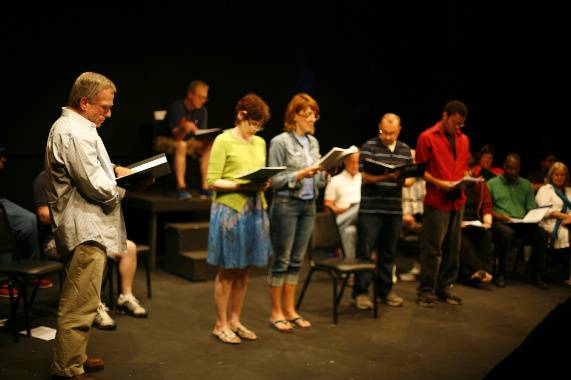
So, the idea that it’s something obtainable led me to contact the board of directors to let them know that I was going to work on this and get the ball rolling. This little play is moving all across the country, being staged in a very informal, unadorned way at various college campuses, community theatres, and some professional theatres that are connected with Broadway Impact, a group formed by Broadway performers to help produce and support impactful social issues type of theatres like this.
SP: The people behind this play are incredible. Dustin Lance Black, an amazing playwright and director. American Foundation for Equal Rights. Can you tell us more about them and what it’s been like working with them?
Green: The co-producer of the show nationwide is American Foundation for Equal Rights, which is the sole supporter of the Perry v. Brown case opposing Prop 8. And so what they ask in addition to ‘keep it simple,’ are also certain strictures on how long you can run it. Most places only get one night. I was able to negotiate two because the Station is smaller. Also, any profits that we make above whatever minimal amount it costs to put it on will go back to American Foundation for Equal Rights to help fund the lawsuit and to keep putting the play out there.
SP: So this play is a triple threat of goodness: informative, entertaining, and philanthropic.
Green: I love the idea that the Station isn’t just doing a great play, which it is, and that would be enough, but it’s also supporting a movement. It’s getting active. It’s not going to be a shock to anybody that the theatre community is basically pro-gay. But at the same time, if this is our community, if this is our family — and I consider the people at the Station my family and I have from very early on in my being there — then you have to stand up for your family.
There’s a lot of competition within theatre companies. Always. There’s creative competition, people going for the same role. But part of that insular, competitive quality of the theatre community is that, ‘Nobody picks on my brother but me.’ When it comes to something like this, where citizens, friends, family members are being threatened or bullied or denied very basic rights, you come away with that feeling of ‘Don’t fuck with my family.’
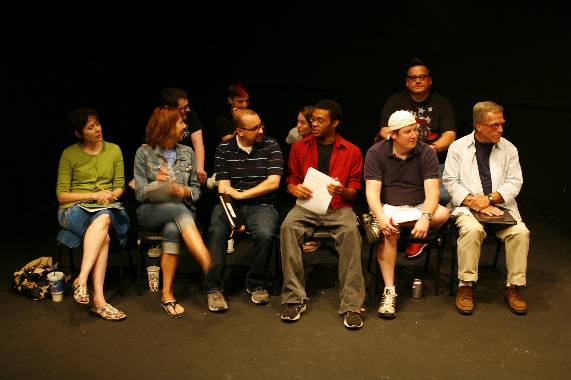
The Plaintiffs
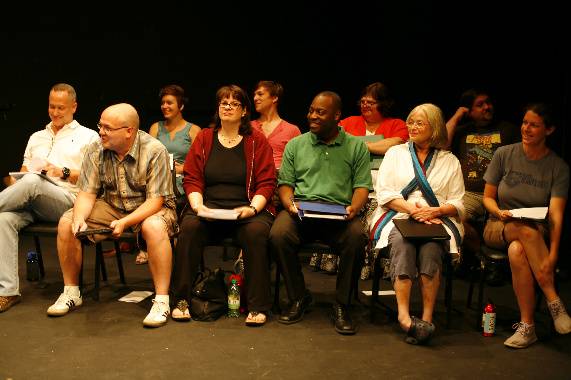
The Defendants
So although Prop 8 doesn’t personally affect my relationship, I have family members who would be affected — both my literal family and my creative family. It gets my blood up, and the only voice I have is the theatre, so how can I use what I have at my disposal to try to say what I think needs to be said?
SP: Ok, just for saying that, just for asking that question, it’s clear that this play belongs with you. It’s in good hands.
Green: But there are other great things about doing this play at the Station — practical things, like the fact that this is our 40th season. And in planning the 40th season, there was the hope that there would be some show during the season that would draw from the entire 40-year history of the Station. And in a way, how do you do that? That’s a lot of people and they’re all over the place. But when 8 came up, I saw that this is that moment. And I started reaching out to people, those who have been with the company since the very first show, 40 years ago. People who joined along the way and became pillars of the company. And then also, I started reaching out to younger company members, some of whom only joined last season and have only done a couple of shows with us, because I look at them and I see the young people who started the company 40 years ago. Theatre is, in many ways, a revolving door, and you always need new blood. But we’re also lost without those lions who have been there to show us the way. And I saw this opportunity to bring together this group of people, and not only to bring together the cast, but to bring together the audience whom we’ve cultivated for 40 years.
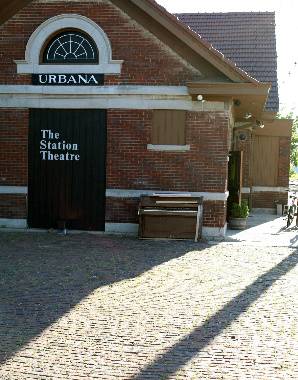 I don’t pretend to know the politics of everyone who comes to our shows, but at the same time, I know what people expect from the Station, and over the course of 40 years, in addition to a lot of very popular, middle-of-the-road kind of shows, we have specialized in the edgy, sometimes political, daring new work. And this is about as new as it gets. And of the moment. You don’t get more contemporary than breaking news.
I don’t pretend to know the politics of everyone who comes to our shows, but at the same time, I know what people expect from the Station, and over the course of 40 years, in addition to a lot of very popular, middle-of-the-road kind of shows, we have specialized in the edgy, sometimes political, daring new work. And this is about as new as it gets. And of the moment. You don’t get more contemporary than breaking news.
To be able to do something with a theatre company that has been around for 40 years, in this tiny little train station, this little black box theatre, in the Midwest, to be able to do something this topical and important to the culture … you hope the theatre will always have that, but oftentimes you have to find that in metaphor. You have to do Julius Caesar and say, ‘Well, this has connections to today’s modern power structure.’ There’s no ambiguity here. The cultural significance is right there on the surface.
Over the course of the season, I’ve been working on a book of the history of the Station, culling from our archives of photographs and programs and news articles, just a mountain of information. In doing that, I’ve read everything written about the Station Theatre that we’ve been able to collect over 40 years. And I’ve been looking at photographs of the people now at the Station who are heroes to me who’ve been doing this. And I’m looking at the first shows they did, and I’m looking at this very hungry, scrappy group of 20- and 30-year-olds putting on plays with no money and minimal sets, just out there with hearts on their sleeves. And I don’t know if it’s the nostalgia of the 40th anniversary, but it feels like this is the time for this kind of play, for us.
SP: Minimal set and no specific costumes. An important play with a meaningful story. Full circle.
Green: Exactly. It’s perfect timing.
SP: Tell us about the actors performing the show. Are some of those “lions” involved? Will you be part of the cast as well?
Green: I originally had planned to be part of the cast, and I reached out to people initially just to make sure that I could cast it and that people would be available in the summertime, and once I started reaching out, people started contacting me, saying they’d love to be involved. So the initial problem of having to pull together 21 actors eventually became, ‘I only need 21 actors.’ Looking at the community that the Station has, the company members, to say that I need 21 really good actors … not that big a problem. The problem is culling which 21 to use because there’s a lot of talent at the Station. So I decided to step back and not play one of the roles and offer an opportunity to somebody else, but I also have myself as a safety net in case we need an understudy.
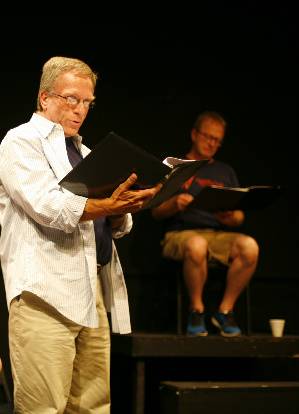 We have performers like Gary Ambler and Steve Keen and Joi Hoffsommer and Kay Holley, who’ve been with the Station for a very long time and have done such great work. Steve and Gary (right, respectively) are maybe two of the best actors that I’ve personally seen. So the idea that they would both say yes still gives me a little bit of a thrill, just that they would work with me. And I’ve worked with them before, but there’s still that fan-boy in me going, ‘He’s so good.’ Lindsey Markel … actually the entire cast of Becky Shaw will be involved. Mike Prosise is reading, Martha Mills.
We have performers like Gary Ambler and Steve Keen and Joi Hoffsommer and Kay Holley, who’ve been with the Station for a very long time and have done such great work. Steve and Gary (right, respectively) are maybe two of the best actors that I’ve personally seen. So the idea that they would both say yes still gives me a little bit of a thrill, just that they would work with me. And I’ve worked with them before, but there’s still that fan-boy in me going, ‘He’s so good.’ Lindsey Markel … actually the entire cast of Becky Shaw will be involved. Mike Prosise is reading, Martha Mills.
This is a play where you have a cast with 21 roles, but there are, maybe, six of the roles that you consider sort of meaty, that get a lot of stage time, and the rest of them are people who come on and they read a scene, or they speak up at one point and maybe come back later, but they are very small roles. And I made sure to let everybody know that. I always worry about wasting people’s time. Obviously, I think it’s a very important show to do, but if other people have other commitments, I don’t want them to feel like they’re obligated and then maybe don’t feel like they’ve gotten enough out of it. Everyone to a person said, ‘No, no, no. Whatever … I don’t care,’ It’s like in Shakespeare, where people come out and hold a lantern and that’s their debut — people are willing to come out and hold a lantern if I need them to, just to be involved in the show. And I’m also getting a lot of cooperation from the cast and crew of Rent, which is the final show at the Station. Its director and many of its actors are participating.
SP: And both shows are free to the public. Was this one of American Foundation for Equal Rights’ stipulations?
Green: You can do it for free or on a donation basis. You can charge a regular ticket rate, as long as a certain percentage of that goes back to American Foundation for Equal Rights.
I’ve always wanted to have a free night of theatre. I love the idea. So I put out the “free” notice with the suggestion of a small donation. I suggested $5, which is, depending on what night you come, either a half or a third of our usual rate. But if people show up and want to see the show and don’t have a dime with them, that’s great too. Have a seat and enjoy the show.
SP: This show is only for two nights, correct?
Green: I’d run it indefinitely if I could.
SP: I hope that places around us, places like Danville or Decatur, will be able to put this play on as well. It’s good that you’ve explained the production side of things. Maybe we can have more shows around the area.
Green: It’s been done in all kinds of different venues. I think it was actually done in a high school. There’ve been a number of performances of 8 in Illinois just in the last month or two.
SP: In downstate or the Chicago area?
Green: Mostly in the northern part of the state. I haven’t seen a lot in the southern part, but I love that the producers of the show are willing to cast the net that wide. It’s really a beautiful idea. I love the fact that, obviously, there’s an underlying motive, and a wonderful one, for getting the word out like this, but at the same time…
SP: Well, we do have our Gay Agenda. I admit that.
Green: Yeah. And why not? How many organizations are going to be accused of a “pro-gay” bias? Theatre is one of the few, you know? [laughing]
SP: There’s an underlying point, a message … there’s a purpose to this play, but there’s also…
Green: There’s also an inclusiveness to their strategy: ‘If you want to do our play, let us know, and we’ll work it out.’ They don’t care about the size of the theatre, however small, or the remoteness of the area, however rural. They want to get the story out there. The most important thing about theatre is telling a good story. If it just so happens that it’s also a true story, fantastic. I’d rather tell a good story than a true one, and in this case I get both.
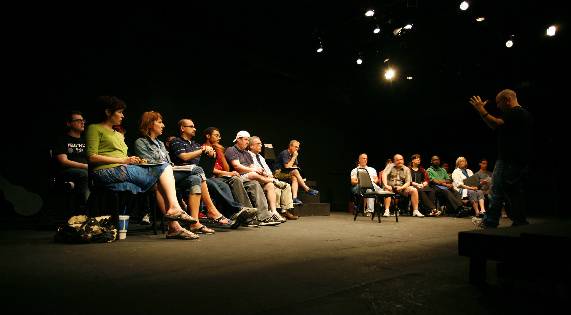
~~*~~
8 is playing at the Station Theatre on Monday and Tuesday, July 2–3, 8:00 p.m.
Schedule:
7:00: doors open
7:15: live music in the theater by Mike Ingram
8:00: reading begins
9:30: facilitated talk-back with representatives of UP Center of Champaign County
All photos by Eric Ponder.








